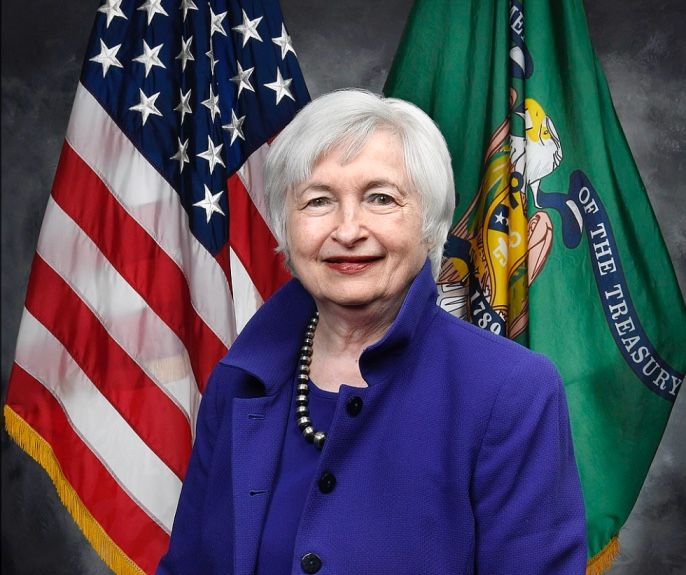Yellen Urges China to Step Up Climate Cooperation and Financing
The Treasury Secretary highlighted that climate change stands atop the list of global challenges, underscoring the imperative for the United States and China to work together in confronting this existential threat.

US Treasury Secretary Janet Yellen's trip to China played a crucial role in stabilizing the relationship between the United States and China, representing a positive step forward.
While the visit did not yield any major agreements or groundbreaking developments, it significantly contributed to thawing the icy tensions between the world's two largest economies, fostering progress in their bilateral ties.
Yellen emphasized the need for more frequent communication and cooperation between the two nations. She also appealed to China for collaborative efforts in addressing global challenges, particularly climate change.

During her visit, Yellen stressed the urgency of tackling climate change and called upon China to join forces with the United States in leading the way. She specifically urged China to take the initiative in assisting impoverished nations in achieving their climate goals and mitigating the impact of climate change.
Yellen also emphasized the importance of enhanced cooperation on climate financing between the United States and China, acknowledging the significant strides made through previous collaborative efforts.
Climate Cooperation
The Treasury Secretary highlighted that climate change stands atop the list of global challenges, underscoring the imperative for the United States and China to work together in confronting this existential threat.
She further implored China to increase its investments in climate finance, emphasizing that as the largest emitter of greenhouse gases, China possesses the potential to make a substantial impact in addressing climate change.
Additionally, Yellen urged China to support existing multilateral climate institutions like the Green Climate Fund (GCF) and the Climate Investment Funds (CIF) in their fight against climate change.
She emphasized the importance of efficient and effective coordination in financing initiatives aimed at combating climate change. Yellen called for closer collaboration on climate financing between the United States and China, urging China to step up its climate finance investments to maximize its impact in tackling climate change.
While specific details regarding the scale of investment or particular projects that China would support were not provided, Yellen stressed the significance of China's assistance in supporting international climate institutions that facilitate the financing of environmentally friendly initiatives.
The GCF and CIF are two multilateral climate institutions that provide funding for projects and programs designed to achieve maximum impact in developing countries. These initiatives focus on promoting shifts towards both mitigation and adaptation to climate change.
Paying to serve climate change agenda

Visit World Future for more foreign news and regional Asean stories The future is yours take it, it will never come again if you let it go there is no future if you let it go. The future is yours so go and take it... take it...
The GCF aims to strike a balance between investments in mitigation and adaptation over time, with a particular emphasis on allocating a significant portion of adaptation funding to highly vulnerable countries, including Least Developed Countries (LDCs), Small Island Developing States (SIDS), and African States.
The GCF offers financial support through a flexible combination of grants, concessional debt, guarantees, and equity instruments to leverage blended finance and encourage private investment in climate action within developing countries.
On the other hand, the CIF provides funding for projects that foster low-carbon development and climate resilience in developing nations. The CIF operates through two funding windows: the Clean Technology Fund (CTF) and the Strategic Climate Fund (SCF).
The CTF primarily finances large-scale, country-led projects and programs that facilitate the demonstration, deployment, and transfer of low-carbon technologies. Conversely, the SCF focuses on financing targeted programs and projects that address specific challenges posed by climate change in developing countries.
Both the GCF and CIF prioritize robust environmental and social standards, including gender and Indigenous Peoples policies, ensuring that projects funded by these institutions are designed, developed, and implemented with these considerations in mind.
The GCF has received funding commitments from 46 countries, including nine developing nations, resulting in the most diverse contributor base among international climate funds. As of August 2022, a total of 34 contributors have pledged USD 10 billion to the GCF-1. The top five contributors to the GCF are Japan, France, Germany, the United Kingdom, and the United States.
Internationalisation
Meanwhile, the CIF receives support from Climate Fund Managers (CFM) and Invest International B.V. (II) of the Netherlands, Sanlam Limited of South Africa (Sanlam), the Development Bank of Southern Africa (DBSA), and the Industrial Development Corporation of South Africa (IDC).
The CIF serves as a multilateral climate fund that channels funds from government donors and the private sector to support over 370 projects across 72 countries. The primary contributors to the CIF include the European Union (EU), the United States, and Japan, with the EU being the largest contributor, providing €2.2 billion in funding.
Other countries such as Canada, Australia, France, Germany, Italy, Spain, Sweden, and the United Kingdom also contribute to the CIF. The CIF operates with three interconnected and mutually reinforcing strategic objectives, empowering transformations in clean technology, energy access, climate resilience, and sustainable forests in middle- and low-income countries.
The CIF supports projects in various areas, including water supply and sanitation, transportation, sustainable energy, sustainable agriculture, support for small and medium-sized enterprises (SMEs), general environmental protection, and reconstruction relief.
Yellen's visit to China marked progress in US-China relations and emphasized the importance of cooperation on climate change. The call for increased climate finance investments and support for multilateral climate institutions highlighted the significance of joint efforts in addressing this global challenge.

